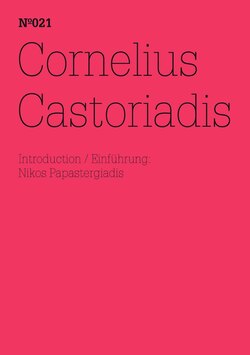Cornelius Castoriadis

Реклама. ООО «ЛитРес», ИНН: 7719571260.
Оглавление
Cornelius Castoriadis. Cornelius Castoriadis
Отрывок из книги
Nikos Papastergiadis
Notes without Notebooks: Freehand
.....
Castoriadis was born in Constantinople in 1922. In 1941, he joined the Communist Party of Greece. Within a year, he decided to split, and for his trenchant criticisms of all authoritarian and bureaucratic ideologies he found himself on both fascist and Communist death lists. Throughout his life, he remained a critic of Soviet Communism and all forms of totalitarianism. With the aid of a scholarship offered by the French Institute of Athens, he fled to Paris in 1945. By 1948, along with Claude Lefort, he founded the left-wing radical group Socialisme ou Barbarie (Socialism or Barbarism). This group included, among others, Jean-François Lyotard. It developed strong links with postcolonial revolutionaries like C. L. R. James, took a principled stance in support of the Algerian struggles for liberation, and influenced many workers’ movements throughout Europe. Daniel Cohn-Bendit was one of the many to cite the influence of Castoriadis’ early revolutionary writings on the student uprisings of May ’68. During this period, Castoriadis worked as an economist for the OECD, but given his status as an immigrant, he wrote under various pseudonyms. It was not until 1970 that he gained French citizenship and wrote under his own name. By 1973, he had commenced work as a psychoanalyst, and seven years later he joined the École des hautes études en sciences sociales. Throughout his life, Castoriadis was an admirer of aesthetic innovations and a lover of jazz. Octavio Paz and Milan Kundera were among the circle of his artistic friends. He died in 1997 in Paris.
At the core of Castoriadis’ thinking were three main concepts: the imaginary, creation, and autonomy. These concepts are deeply interrelated and refer to the broad range of means by which a society develops symbolic forms and institutional structures to articulate its own identity. Castoriadis always stressed that social structures in general are not simply the product of prevailing economic forces or determined by fixed political frameworks, but rather that they are always conditional on the imaginary. The imaginary is neither a natural nor a rational configuration, but is the outcome of the people’s identification with a specific social structure and their collective capacity to create their own institutions. Hence imagination, as Castoriadis reminds us in the above-mentioned draft reproduced in this notebook, is not simply a subjective state. It is also the collective capacity of the people to define their own rules and create their own social structures. Through these concepts of the imaginary and creation we also arrive at the crux of his term autonomy. It is through creation that being is given form, otherwise existence is an “abyss, chaos, groundless.” For Castoriadis, creation is neither the reconfiguration of existing elements nor the assemblage that results from external pressures. Creativity is the process through which a paradigm of being is distinguished from the multitude of forces that exert influence on it. Castoriadis stressed that creation emerged in the world ex nihilo. Thus his theory of creation is different from other versions that put the emphasis either on mimesis (the expression of things in a given form) or discovery (the recognition of something that is already there but not quite noticed) or even synthesis (the novel reutilization of known entities). For Castoriadis, creation, whether it produces the Parthenon or Auschwitz, is always embedded in a specific historical context. However, the boldness of his theory also hinges on his examination of the radical and mysterious form by which creation produces newness. Creation is therefore not just the product of its time, for it also comes out of a void and asserts itself as the new and necessary form for living. His favorite example was the eruption of democracy in ancient Athens.
.....